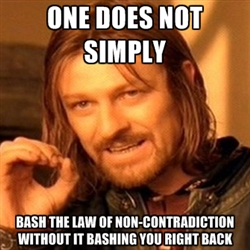Sure we can avoid conflict by transcending opposites. We just can’t care about outcomes at the same time.
 I’ve been trying to get various UU ministers to engage on the issue of embracing contradictions. I’ve cited Aristotle’s Law of Non-Contradiction to show that, if we embrace contradictions, we can prove any claim (the Explosion problem). We have a new intern at our church who sent me this article. It’s the first real attempt I’ve seen from a UU minister to articulate and defend the Buddhist and Jain logic of embracing contradictions.
I’ve been trying to get various UU ministers to engage on the issue of embracing contradictions. I’ve cited Aristotle’s Law of Non-Contradiction to show that, if we embrace contradictions, we can prove any claim (the Explosion problem). We have a new intern at our church who sent me this article. It’s the first real attempt I’ve seen from a UU minister to articulate and defend the Buddhist and Jain logic of embracing contradictions.
http://www.beyondwilber.ca/healing-thinking/both-and-logic.html
The article notes the motivation for doing so:
“Such transcendence is profoundly healing since it transcends the thinking mind and language.”
The worry here is that we can be selfish in our desire for healing. It is good to want healing, calm, quiet, etc but not at any cost. Peace that requires us to look the other way at injustice or suffering is not the peace I want.
“The so-called law of contradiction is still widely taken for granted: A cannot be both A and not-A.”
Aristotle said that we must accept the Law of Non-Contradiction if any of our claims are to have any meaning. He didn’t provide a proof, he only noted that we MUST accept it on pain of irrationality and meaningless. The Explosion problem was noticed later:
http://en.wikipedia.org/wiki/Principle_of_explosion
“Thus, in physics, it was taken for granted that light cannot be both a wave and particle (not-wave) phenomenon.”
No. Quantum phenomena have been seized on by Eastern thinkers as proof that the LON doesn’t hold in nature, but this is a mistake. Nature does not even have the concepts of ‘Wave’ and ‘particle’. It simply is, and our theories speak about nature in their various domains. There is no contradiction in saying that photons manifest as waves and particles depending on the experimental setup. This is a red herring.
>the Buddha first taught that the world is real. He next taught that it is unreal. To the more astute students, he taught that it is both real and not real. And to those who were furthest along the path, he taught that the world is neither real nor not real.
Aristotle’s insight applies here. If the word ‘real’ is to have any meaning, we can’t change its definition midway through a sentence. This is equivocation. It can be very hard to detect, and is a common trick in liberal theology, especially concerning the word ‘God’. If we care about our beliefs, we have to use one given meaning for a given word at a time.
So, yes, transcendental resolutions of contradictions are available to us, but they have a cost. Let’s take a real example, mumps. We could say, “Mumps are bad” as a way to push for vaccinations of our kids. Jain logic would have us say:
1. “in some ways it is”2. “in some ways it is not” 3. “in some ways it is and it is not” 4. “in some ways it is and it is indescribable” 5. “in some ways it is not and it is indescribable” 6. “in some ways it is, it is not and it is indescribable” 7. “in some ways it is indescribable”
This form of seven-valued logic avoids dogmatism, antagonism, and conflict.”
If you come to a CDC meeting on Capitol Hill armed with Jain logic, you will be unable to argue for a particular outcome. If avoiding dogmatism, antagonism and conflict is your goal, then Jain logic is for you. If saving kids’ lives is your highest value, then you should bring Aristotelian logic.
Here’s the crux of the matter as I understand it:
As soon as I value something, like keeping my kid alive, I have left Jain logic behind. Sure, raw nature can live that way, where there is no value attached to whether my kid lives or dies, but I can’t, or won’t.
So, it may be that kids, their bodies and the mumps pathogen ACTUALLY live according to Jain logic. I’d say that was true a million years ago, in our natural, brutal state. But ONCE WE ACQUIRED VALUES, we left that world. Today, I live in a world where there are better and worse ways to treat my kids, women, gays and the various races. I have grown up. The comforting mist of transcendental logic is no longer available to me, except as a philosophical inquiry.
“What has been cut apart by divisive Aristotelian either/or logic can be reunited by both/and logic.” Yes, but at a cost, one that is fatal to our values.
“Reaching beyond the thinking mind is healing in a profound way. It removes the agitation of the thinking mind and delivers us into the calmness of infinite wisdom.” Yes, but calmness and removing agitation are not my highest values. Because I have certain values, I willingly give up my serenity and oppose their opposites.
<photo id=”1″ />


Recent Comments